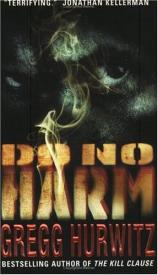Do No Harm
Review
Do No Harm
You gotta watch it when you pick up a medical thriller. It's okay if you read while riding the bus, or watching television, or listening to music, or sitting in a meeting, but if you're in the habit of reading while you eat (or, like a lot of us, eating while you read), a medical novel might not be your book of choice. The reason is that authors who write medical suspense novels are usually acquainted with medical procedures. There is no doubt that some obscure corollary to Murphy's Law dictates that you'll be noshing on some dark meat turkey and washing it down with tomato juice about the time that you hit the description of an emergency tracheotomy being performed, with a graphic description of blood hitting a nurse's spectacles. No, med thrillers are not for the faint of heart, or stomach.
For the rest of us, however, (and yeah, that was me you heard howling with laughter in the theater during parts of Seven) a well done med thriller is just the berries. As one of the characters in Gregg Andrew Hurwitz's DO NO HARM so succinctly points out, a hospital may have the mission of preserving life (at least in most cases) but it is full of instruments of death, and they come at you from all sides. Scalpels, needles, scopes, and the always dreaded catheter ("Uh, do you have that in a 'short'?")...the list is endless. And if you want to be on the edge of your seat from beginning to end, DO NO HARM will get the job done.
Hurwitz revs his considerable literary engines from the opening gun, beginning DO NO HARM with an account of the immediate aftermath of a deliberate chemical burn attack. If Hurwitz's aim was to scare the bejesus out of his readers, he succeeded in doing so to at least one. The only time I put down DO NO HARM during the entire time I was reading it was about five pages into it, when I got up, dragged a chair over to the cupboard and dragged the drain cleaner, bleach, ammonia, and anything else that looked even remotely toxic off of the top shelf (one of the drawbacks to marrying someone taller than you) to the local toxic waste dump. Hurwitz manages, horribly but brilliantly, to later present a shower scene that makes anything in Psycho look like a scene from ROLIE POLIE OLIE. The principal behind this mayhem is gradually revealed in bits and pieces, as are the perpetrator's motives. Hurwitz's ultimate focus, however, isn't the who, what, and where. It's more complicated. It's about how hard it is to do good --- and whether doing the good thing is the right thing --- in a bad world.
Hurwitz's maligned subject is David Spier, MD, chief emergency room physician at a hospital where he is a legacy, thanks to his physician parents. Spier is on hand to treat the first two victims, both hospital colleagues, after they are assaulted by a lye-throwing madman whom we come to know as "Clyde" and who seems to appear and vanish at will. When Clyde is caught, and injured in the process, it is Dr. Spier who must treat him, and treat him as he would any other patient, notwithstanding Spier's distaste and anger as well as the adverse reaction of his hospital colleagues. Clyde escapes during the course of Spier's care; Spier is blamed for the escape as well as the resultant mayhem that follows and strikes closer and closer to home. Hurwitz, without sacrificing the sustained suspense of DO NO HARM, deftly explores the ethical dilemma that Spier faces as a physician: whether to give the best possible care to an individual who wishes to, and is capable of, inflicting severe physical damage upon the physician and his loved ones. The textbook, theoretical answer, is that the physician must treat such an individual as he would any other patient. The real world application, however, is not always so clear cut. Hurwitz provides Clyde with a sympathetic background, but as one of the police officers succinctly points out, Clyde knows he's doing wrong. Otherwise, why would he hide?
Hurwitz has written a topnotch thriller here, with some gruesome images that will stay with you for longer than you may like. What will resonate even longer, however, is the ethical dilemma, which Hurwitz neatly presents, and which, by the conclusion of DO NO HARM, is not entirely answered.
Reviewed by Joe Hartlaub on January 21, 2021




